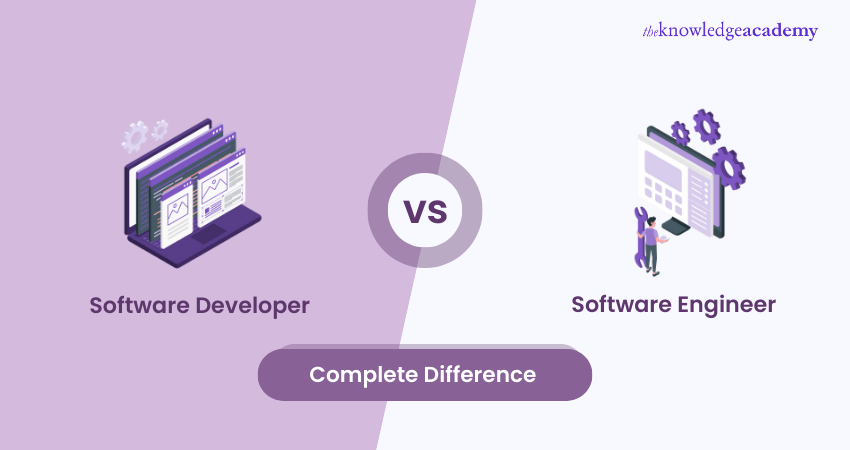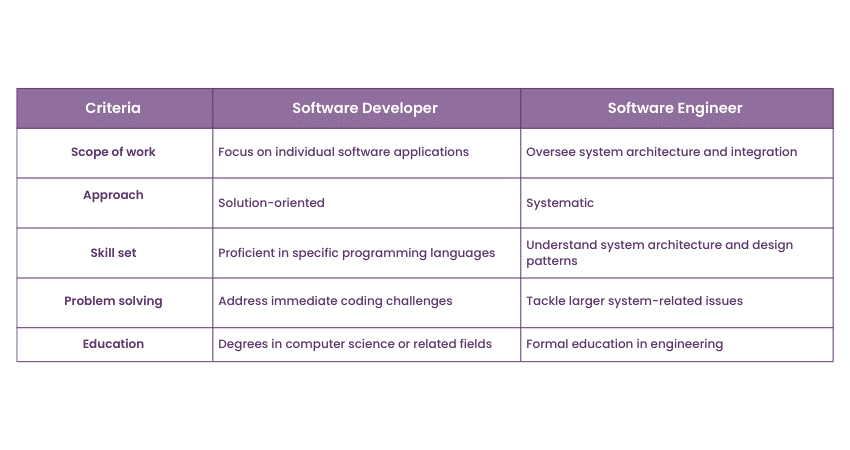We may not have the course you’re looking for. If you enquire or give us a call on 01344203999 and speak to our training experts, we may still be able to help with your training requirements.
We ensure quality, budget-alignment, and timely delivery by our expert instructors.

Regarding tech careers, the debate of Software Developer vs Software Engineer is a common topic that sparks curiosity and confusion. While both roles are deeply involved in creating software, their approaches and mindsets vary in fascinating ways. A Software Developer is like a craftsman, focusing on building functional, user-friendly applications that meet specific needs.
Meanwhile, a Software Engineer approaches the task with a problem-solving mindset, using engineering principles to ensure the software is scalable, efficient, and robust. So, whether you're a developer crafting the next big app or an Systems Engineer optimising complex systems, understanding the difference between Software Developer vs Software Engineer is key to choosing the right path in the ever-evolving tech world.
Table of Contents
1) Understanding the Job Roles
2) What’s the Difference Between Software Developer vs Software Engineer?
a) Scope of Work
b) Approach
c) Skill Set
d) Problem Solving
e) Education
3) The Converging Paths of Software Developers and Software Engineers
4) Are Software Engineers Typically Involved in Project Management?
5) Is Software Engineering More Theoretical Than Software Development?
6) Conclusion
Understanding the Job Roles
In the tech industry, we often encounter two titles; Software Developer and Software Engineer. While they may seem interchangeable at first glance, they hold distinct roles and responsibilities. Let's explore these nuanced differences.
Software Developer
Software Developers are the digital realm's craftsmen, transforming ideas into tangible software. They interpret concepts, draft digital blueprints, and use programming languages to create the core application. Their journey often involves testing the software, identifying glitches, and refining it for optimal user experience. In some environments, they may even oversee the software's deployment, ensuring it reaches the end-users seamlessly.
Software Engineer
Software Engineers, contrasting developers, approach software with meticulous engineering principles. Their domain extends beyond mere development to encompass system integration and architecture. They ensure software not only functions but also seamlessly integrates within larger systems, is scalable for future growth, and remains robust against challenges. Their vision encompasses the software's entire lifecycle and its place within a broader digital ecosystem.
Interested in building powerful software? Try our Software Engineering Training today!
What’s the difference between Software Developer vs Software Engineer?
In the intricate realm of software professions, the titles "Software Developer" and "Software Engineer" often intermingle. However, beneath the surface, there lie distinct differences in their roles, approaches, and expertise. This segment delves into these nuances, shedding light on the unique facets each title embodies.

Scope of Work
Software Developers specialise in devising and refining individual software applications. Their realm often includes leveraging frameworks such as React for frontend development or Django for backend processes. Immersed in this detailed-oriented environment, developers use libraries like jQuery to enhance user interfaces, to deliver a functional and user-friendly product.
Software Engineers operate with a broader view, engineers orchestrate the software's alignment within a vast digital infrastructure. This might involve understanding cloud platforms like AWS or Azure to ensure scalability and using orchestration tools like Kubernetes for container management. Their role demands a comprehensive overview, ensuring that individual software elements sync harmoniously within a larger ecosystem.
Approach
Software Developers are task-driven and rooted in the present, hence they constantly seek efficient solutions to imminent challenges. Utilising IDEs like Visual Studio Code or JetBrains IntelliJ, they streamline their coding process. Libraries such as Axios or tools like Postman might come into play when they're interfacing with APIs or testing endpoints.
Software Engineers with their far-reaching vision, strategise across the software's entire lifecycle. This might involve using version control systems like Git to manage code changes or incorporating CI/CD pipelines with tools like Jenkins for automated testing and deployment. Their foresight ensures that software not only functions today but remains adaptable for future innovations.
Interested in system formulation? Try our Systems Engineering Training today!
Skill Set
Software Developers master specific programming languages, be it Python, JavaScript, or Java, developers further enhance their repertoire with frameworks like Express.js for web application development or libraries such as Lodash for JavaScript utility functions. Their toolkit, tailored for software creation, often includes databases like MongoDB or PostgreSQL.
Coding stays a foundational skill for Software Engineers, but they also delve deep into system design and architectural patterns. Knowledge of UML for system design, awareness of design patterns like Singleton or Factory, and a grip on architectural styles like microservices, often defines their expanded skill set. Their holistic understanding often leads them to integrate solutions like Redis for caching or RabbitMQ for messaging.
Problem Solving
Software Developers are often seen as the coding vanguard, utilising Software Developer Skills like debugging with Chrome DevTools or Log4j to identify and fix issues. Their agility in problem-solving is often augmented by unit testing libraries, such as Jest for JavaScript or PyTest for Python, ensuring code robustness.
Software Engineers with a macro perspective, anticipate system-wide challenges. Tools like Grafana or Prometheus might aid in monitoring software health, while their problem-solving suite could include distributed tracing tools like Jaeger. They look beyond mere functionality, ensuring software stands resilient against scalability challenges and potential system bottlenecks.
Education
Software Developers academic foundation is generally in computer science; however, their practical expertise is often enriched by certifications in specific languages or frameworks. For example, like a certification in Angular for web app development or deeper dives into languages can be extremely vital to them.
Software Engineers' educational trajectory often intertwines with broader engineering principles. Beyond the typical computer science curriculum, they might pursue specialisations in systems design, distributed computing, or even delve into niche areas such as cybersecurity. This makes Cyber Security vs Software Development an important comparison for anyone considering both fields, with certifications such as Certified Information Systems Security Professional (CISSP) providing additional expertise for those who lean toward Cyber Security.
Learn all about SDLC with our Software Development Lifecycle Training today!
The Converging Paths of Software Developers and Software Engineers
The clear-cut roles of Software Developers and engineers often blend in practical applications, diverging from strict theoretical definitions. Many organisations interchangeably use these titles to reflect upon the evolving demands of contemporary tech environments. Developers might delve into system architecture, typically an engineer's domain, while engineers can find themselves deeply engaged in coding, a space usually reserved for developers.
At the core of this overlap are foundational competencies essential to both roles. Regardless of their title, both Software Developers and engineers manifest an unwavering commitment to problem-solving, with success measured not just by software output but also by their innovative solutions to challenges, such as implementing techniques like Thread Testing in Software Engineering. Their dexterity with myriad tools, languages, and platforms becomes the linchpin for effective communication, collaboration, and creation.
Amidst these shared skill sets, a deeper thread interlinks Software Developers and engineers; an undying passion and comprehension of software's vast expanse. Both factions revel in the nuances of software, its transformative potential, and its boundless possibilities, testifying to the symbiotic dance they often perform in the ever-evolving tech arena.
Do Software Engineers Typically get Involved in Project Management?
While not always, many Software Engineers take on Project Management roles, especially in agile teams, by collaborating with stakeholders and ensuring timely, efficient project delivery.
Is Software Engineering More Theoretical Than Software Development?
Yes, Software Engineering tends to be more theoretical, focusing on principles, algorithms, and system architecture, whereas Software Development is more practical, concentrating on building and implementing applications.
Make sure you’re ready for anything by practicing Software developer interview questions that employers often ask. Get ahead in your job hunt now!
Conclusion
Understanding the distinction between Software Developer vs Software Engineer is crucial for aspiring professionals and organisations. While Software Developers focus on crafting user-friendly applications, Software Engineers approach problems with a broader, system-level perspective, ensuring scalability and performance. Both roles are vital in the tech world, and each offers unique challenges and rewards in software creation.
Try our Java Programming and Software Engineering Fundamentals Training today!
Frequently Asked Questions
What Career Growth Opportunities Exist for Software Developers and Engineers?

Both roles offer significant growth, with Software Engineers advancing into leadership or architecture positions. At the same time, developers can specialise in advanced coding skills or move into Product Management or full-stack development.
Which Role is Better Suited for Someone new to Programming?

Software Development is often a better starting point for beginners, as it focuses on coding and building applications, offering a more accessible entry into programming compared to the broader, more theoretical engineering role.
What are the Other Resources and Offers Provided by The Knowledge Academy?

The Knowledge Academy takes global learning to new heights, offering over 3,000 online courses across 490+ locations in 190+ countries. This expansive reach ensures accessibility and convenience for learners worldwide.
Alongside our diverse Online Course Catalogue, encompassing 19 major categories, we go the extra mile by providing a plethora of free educational Online Resources like News updates, Blogs, videos, webinars, and interview questions. Tailoring learning experiences further, professionals can maximise value with customisable Course Bundles of TKA.
What is The Knowledge Pass, and How Does it Work?

The Knowledge Academy’s Knowledge Pass, a prepaid voucher, adds another layer of flexibility, allowing course bookings over a 12-month period. Join us on a journey where education knows no bounds.
What are Related Courses and Blogs Provided by The Knowledge Academy?

The Knowledge Academy offers various Software Engineering Courses, including the Systems Development Essentials Training, Software Design and Architecture Training and Java Programming and Software Engineering Fundamentals Training. These courses cater to different skill levels, providing comprehensive insights into Difference Between OOP and POP.
Our Programming & DevOps Blogs cover a range of topics related to Software Testing, offering valuable resources, best practices, and industry insights. Whether you are a beginner or looking to advance your Software Testing Skills, The Knowledge Academy's diverse courses and informative blogs have got you covered.






 Top Rated Course
Top Rated Course




 If you wish to make any changes to your course, please
If you wish to make any changes to your course, please


